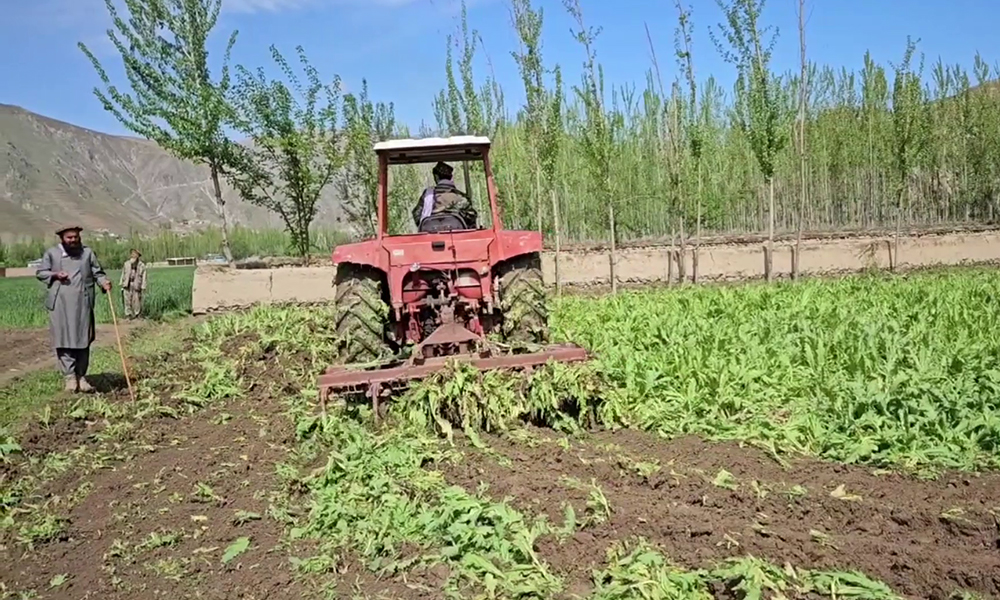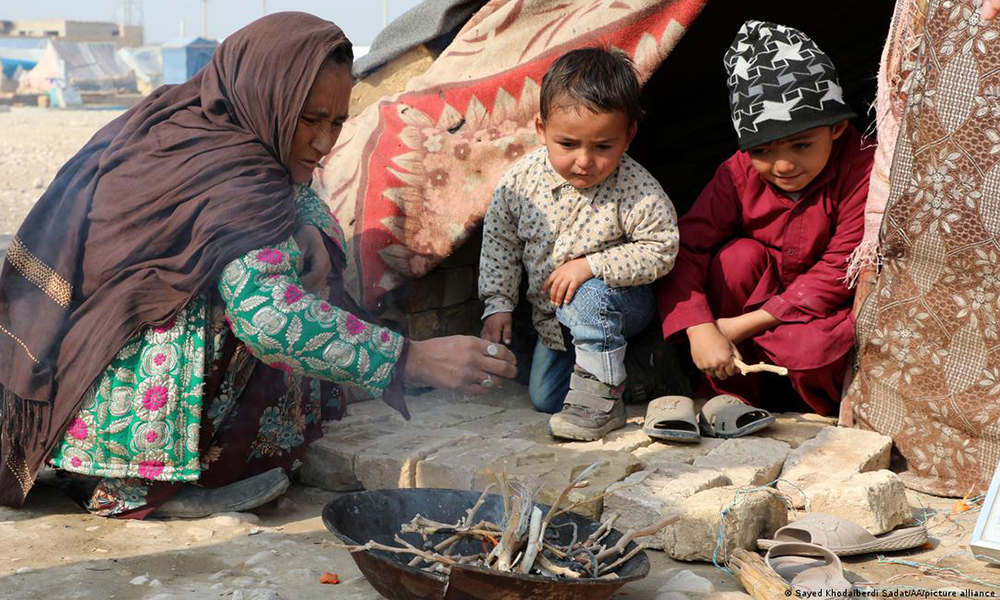Latest News
Biden says ‘May 1 deadline’ is hard in terms of tactical reasons

U.S. President Joe Biden on Thursday at the first formal White House news conference of his presidency said that it would be “hard” to withdraw the last U.S. troops from Afghanistan by a May 1 deadline, but he added that he did not think they still would be there next year, Reuters reported.
Biden comments come as his administration strives to build international pressure on the Taliban and U.S.-backed Afghan President Ashraf Ghani’s government to reach a peace agreement and a ceasefire before the deadline.
According to Reuters report peace talks, however, are stalled and by suggesting U.S. troops would be gone next year, Biden risked weakening Ghani’s bargaining hand and encouraging the Taliban, who U.S. officials say have stepped up violence in their quest to oust him, to play for time, some analysts said.
During the news conference Biden said it would be hard to meet the May 1 deadline to withdraw the last 3,500 U.S. troops “just in terms of tactical reasons.”
“It’s gone be hard to meet May 1 deadline in terms of tactical reasons hard to get those troops out,” Biden told reporters.
He apparently was referring to the enormous logistical challenges of pulling out the roughly 10,000 American and foreign troops and their equipment within the next six weeks.
Biden was asked if it was possible that there still would be U.S troops in Afghanistan next year. “I can’t picture that being the case,” he responded.
The Taliban have indicated they could resume attacks on foreign troops if Biden does not meet the May 1 deadline.
The deadline was set in a February 2020 deal struck with the Taliban under former President Donald Trump.
It called for a phased conditions-based drawdown of U.S. troops from America’s longest war. The Taliban were required to prevent Islamist militant groups such as al Qaeda from using Afghanistan as a base from which to attack U.S. and allied targets.
Trump, however, ordered the drawdown to proceed even though violence escalated, U.S. officials said the Taliban had failed to cut ties with al Qaeda and disputes delayed the start of the intra-Afghan talks on a ceasefire and a settlement to decades of strife.
Washington, meanwhile, has yet to act on its commitment to have U.N. and U.S. sanctions on senior Taliban leaders lifted.
The Taliban deny they are responsible for the surge in bloodletting or that there are al Qaeda fighters in Afghanistan.
Biden noted that Secretary of State Antony Blinken has been in Europe meeting with U.S. allies that have troops in Afghanistan and “if we leave, we are going to do so in a safe and orderly way.”
“The question is how and in what circumstances do we meet that agreement that was made by President Trump to leave under a deal that looks like it’s not being able to be worked out to begin with,” Biden said.
“We will leave. The question is when we leave,” he added.
U.S. peace envoy Zalmay Khalilzad, who negotiated the withdrawal deal for Trump and was kept on by Biden, has circulated a U.S.-drafted peace proposal that would replace Ghani’s government with an interim power-sharing administration.
Ghani repeatedly has rejected stepping aside, saying any transfer of power would have to take place through elections as required by the constitution. Taliban officials have said they would not participate in an interim government, but would recommend members.
Biden comments comes after former US National Security Advisor HR McMaster said on Wednesday night he is very concerned about the withdrawal of troops from Afghanistan and felt it could result in a “catastrophe” for the Afghan people and for the region.
Speaking at a Hoover Institute debate, McMaster said this “so-called responsible end of the war in Afghanistan, which I think could be catastrophic not only for the Afghan people but for the people of the region, for Europe; and also result in increased risk from Jihadist terrorist organizations”.
McMaster said he would like to ask President Joe Biden about the “resurrection of the language of responsible end of the war”. He said this term was last used in 2011 regarding the Iraq withdrawal.
“Of course we know what happened a couple of years later with the rise of ISIS there,” he said adding whether Biden was, as such, concerned “about replicating that experience in Afghanistan in a way that creates a humanitarian catastrophe.”
Latest News
Over 6,000 acres of land cleared of poppies in Badakhshan

Badakhshan Police Command says it has cleared more than 6,000 acres of poppy fields in northern Badakhshan province.
The anti-narcotics department of Badakhshan Police Command says that since the beginning of the campaign to destroy the poppy fields in this province, they have cleared more than 6,000 acres of land.
According to these officials, poppies have however been planted in more than 10 districts this year.
The anti-narcotics department of the Badakhshan Police Command says that the campaign to destroy the poppy plantations started two months ago and continues.
According to the officials, during this period, 6,300 acres of land has been cleared.
Some of the farmers whose fields were destroyed say that poppy is more profitable than other agricultural products, but now that their land has been cleared, they want alternative crops.
According to the officials, Kishim, Argo, Darayimand and Jurm districts are among the districts where poppies are cultivated.
Latest News
MSF ‘deeply concerned’ over new phase of deportations of Afghans from Pakistan

Médecins Sans Frontières (MSF) said Wednesday it was deeply concerned for the rights and welfare of Afghan refugees in Pakistan in the wake of the recent announcement by Islamabad that it plans to start Phase Two of the deportation campaign.
Pakistan is home to an estimated 3.7 million Afghans, and a reported 500,000 have crossed the border so far.
Many Afghans living in Pakistan have been there for decades and have spent more time in the country than their country of origin, without any legal recourse to remain in the only place they can effectively call “home”.
For many Afghans, Islamabad’s “repatriation” campaign means packing up their belongings and carrying them on a horse, cart, car and bus and traveling en masse to a country that is already struggling with widespread poverty, inadequate health services and increased restrictions on women, MSF said in a statement.
The second phase of the deportations leaves an estimated 800,000 Pakistan-issued Afghan Citizen Card (ACC) holders vulnerable to return, while phase three is expected to result in the further deportation of UNHCR-issued Proof of Registration (PoR) card holders, MSF said.
MSF first started working in Pakistan in 1986, and today provides much-needed medical care to people in Balochistan, Khyber Pakhtunkhwa and Sindh provinces.
The Islamic Emirate of Afghanistan (IEA) and UN agencies estimate that more than half a million people have been deported from Pakistan or voluntarily returned to Afghanistan in the past six months.
The United Nations High Commissioner for Refugees said last month that nearly two million Afghan refugees are living in Pakistan and that the agency needs $368 million this year to assist these people.
Latest News
2023 marred by ‘tremendous challenges’ for Afghanistan

Last year, 2023, was a year of “tremendous challenges” for the people of Afghanistan, but it was also a year marked by resilience and determination, the Deputy Special Representative of the Secretary-General, Resident and Humanitarian Coordinator, Indrika Ratwatte, said in the UN’s annual report on Afghanistan that was published this week.
Ratwatte said: “In the face of adversity and multiple concurrent shocks, the people of Afghanistan have demonstrated remarkable courage and strength.”
Afghans now mention access to food as their most pressing need, he said adding that “unable to pay for or produce basic sustenance, millions face hunger and malnutrition.”
In 2024, an estimated 15.8 million people will experience crisis and emergency levels of food insecurity.
The majority of the population is unable to procure basic needs such as healthcare, food, livelihoods, and housing, the report stated.
The UN found that the country also remains vulnerable to climate change.
Following the worst drought in three decades, emerging El Niño conditions now threaten a new cycle of flooding and crop pests. In this context, lifesaving humanitarian aid has been crucial in preventing the collapse of the social fabric. It has also served to underpin the stability of the economy. Despite growing humanitarian needs, relevant funding cuts have forced humanitarian actors to prioritize the most vulnerable further, the report stated.
A Gallup poll found that 95 percent of the population consider themselves to be suffering. In addition to living in poverty, the average life expectancy in Afghanistan has been falling for the past five years.
The Herat earthquakes and unprecedented large-scale returns of refugees from neighbouring countries, including Pakistan and Iran, have shown the disruptive impact of recurrent shocks and underscored the need for sustained international engagement and support, the UN stated.
“As we embark on the next chapter, in 2024, it is imperative that we remain steadfast in our commitment to the principles of human rights, gender equality, and women’s Empowerment,” Ratwatte said.
“We will continue to include women as key partners in our work, to provide assistance ‘by women, for women’, and to tirelessly work for equal access to education in line with the demands we hear from Afghans in all areas of the country,” he said.
However, from an economic point of view, Afghanistan’s economy appears to be stabilizing at a low equilibrium level following a period of significant contraction since 2021.
The UN said in the report that growth barriers include severely restricted operations in the banking sector (including microfinance institutions), trade disruptions, and institutional issues hindering service delivery, including in the private sector.
“The sudden cessation of a significant amount of international aid and grants, which had accounted for 40 percent of the country’s Gross Domestic Product (GDP), along with a freeze on international reserves amounting to about US$9 billion and the imposition of international sanctions, caused a severe balance of payments, banking and payment systems crisis.
“Notably, financial restrictions have removed liquidity from the banking system,” the report stated.
Despite the crisis and a period of devaluation towards the end of the year, the AFN is 20 percent stronger than it was in 2021 due to currency export controls, UN cash shipments of US dollars into Afghanistan, and personalremittances.
Imports continued to surpass exports through 2023 and increased as the economy contracted.
“This appears to be a paradox: the currency appreciated while the trade deficit widened, suggesting that there might be other unidentified sources of financing besides US dollar cash shipments and remittances to support the account deficits,” the report read.
The UN also said that with its partners, it will work to initiate a dialogue with the Islamic Emirate on adjustments to regulatory frameworks and sustained public service delivery with the aim of creating a long-term and sustainable pathway to reduce aid dependency and put Afghanistan back on a path towards development
“In this regard, we reiterate our offer to the DFA for a dialogue and will work jointly with international partners, donors, and Afghans on how such engagement can be structured in a most productive way.”
-

 Sport5 days ago
Sport5 days agoACL draw to be broadcast live on ATN channels
-

 Regional5 days ago
Regional5 days agoIRGC chief warns of harsher response if Israel attacks Iran
-

 Sport4 days ago
Sport4 days agoACL fever grows as fixtures finalized
-

 World4 days ago
World4 days agoUS will not take part in any Israeli retaliatory action against Iran
-

 Latest News4 days ago
Latest News4 days agoOver 50 people dead in traffic accidents over Eid
-

 Latest News4 days ago
Latest News4 days agoUS identifies Kabul airport suicide bomber
-

 Business4 days ago
Business4 days agoAfghanistan-Kazakhstan chamber of commerce opens in Herat
-

 Latest News4 days ago
Latest News4 days agoGood rains enable DABS to increase power production in Kabul
























